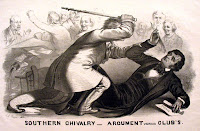Ceteris Paribus turned 10! (4 months ago)
Labels: Anniversary, Shameless Self-Promotion, Yay
Now with more Alt-Text!
Labels: Anniversary, Shameless Self-Promotion, Yay

Labels: DesiPundit, Fundaes, Modest Proposals, Satire
Labels: Comparitive Pop-Culture, DesiPundit, Movies
 of that same Mesopotamia campaign. The Siege began in the December of 1915, when the Sixth (Poona) Division of the Indian Army established a position in the town of Kut after retreating from another battle. Their dithering commander, Charles Townshend, failed to break out of the town despite multiple opportunities to do so, and his equally incompetent counterparts in the relief force failed to dislodge the numerically inferior Turkish besiegers. Finally after four months, his soldiers starving and reduced to eating their pack animals, Townshend surrendered unconditionally to the Turks. While he lived out the rest of the War in comfort, Townshend's troops were treated brutally by the Turks. Of the 30,000 odd troops he started out with, about 13,000 lived to surrender along with Townshend. Barely four thousand survived the two and a half years of ill-treatment and privation at the hands of the Ottoman Army. After failing to do much to protect his men from their captors, Townshend returned home to a hero's acclaim and was elected to Parliament.
of that same Mesopotamia campaign. The Siege began in the December of 1915, when the Sixth (Poona) Division of the Indian Army established a position in the town of Kut after retreating from another battle. Their dithering commander, Charles Townshend, failed to break out of the town despite multiple opportunities to do so, and his equally incompetent counterparts in the relief force failed to dislodge the numerically inferior Turkish besiegers. Finally after four months, his soldiers starving and reduced to eating their pack animals, Townshend surrendered unconditionally to the Turks. While he lived out the rest of the War in comfort, Townshend's troops were treated brutally by the Turks. Of the 30,000 odd troops he started out with, about 13,000 lived to surrender along with Townshend. Barely four thousand survived the two and a half years of ill-treatment and privation at the hands of the Ottoman Army. After failing to do much to protect his men from their captors, Townshend returned home to a hero's acclaim and was elected to Parliament.Labels: DesiPundit, War is Hell, WW1
 man, of marzipan medallions eaten on no other day (thanks for the factoid Betsy!) and of general Gustavus Adolphusness all around. But it is also an occasion to consider Gustavus Adolphus's greatest achievement: his awesome name. As a keen student of Renaissance European history I feel I can say with no fear of exaggeration than Gustavus Adolphus' is the awesomest royal name of the entire era.
man, of marzipan medallions eaten on no other day (thanks for the factoid Betsy!) and of general Gustavus Adolphusness all around. But it is also an occasion to consider Gustavus Adolphus's greatest achievement: his awesome name. As a keen student of Renaissance European history I feel I can say with no fear of exaggeration than Gustavus Adolphus' is the awesomest royal name of the entire era.Labels: Bogus Theories, DesiPundit, Kings, Renaissance, Vikings
 might be in line for next year. Since the Norwegian Nobel Committee that awards the Prize famously only accepts nominations until the first day of February in the year of the Prize, I figure its not too early to nominate a winner. And my nominee is the Norwegian Nobel Committee itself. Or more specifically, the current Norwegian Nobel Committee. Thorbjørn Jagland, Kaci Kullmann Five, Sissel Rønbeck, Inger-Marie Ytterhorn and Ågot Valle, I nominate you yourselves to be next year's Nobel Peace Prize winners.
might be in line for next year. Since the Norwegian Nobel Committee that awards the Prize famously only accepts nominations until the first day of February in the year of the Prize, I figure its not too early to nominate a winner. And my nominee is the Norwegian Nobel Committee itself. Or more specifically, the current Norwegian Nobel Committee. Thorbjørn Jagland, Kaci Kullmann Five, Sissel Rønbeck, Inger-Marie Ytterhorn and Ågot Valle, I nominate you yourselves to be next year's Nobel Peace Prize winners.Labels: Barack Obama, DesiPundit, Krazy Kristianians, Nobel Prizes
.jpg) writer and journalist. They don't randomly hand out Pulitzers to the unaccomplished, and Friedman has three of those babies sitting in his trophy cabinet. His reporting on Middle East conflict and the First Palestinian Intifada in particular are well regarded. His book From Beirut to Jerusalem has won awards for what I presume is its general awesomeness. Another thing is, being who he is he has access to the world's elites, and in between wining, dining and golfing with them, he manages to glean some of their insights and knowledge in a way few other people do. Most of all, Friedman is a good writer, and he manages to hold his reader's attention even when they do not agree with him. I don't generally share Friedman's views, but I have been reading his columns off and on for the past six years.
writer and journalist. They don't randomly hand out Pulitzers to the unaccomplished, and Friedman has three of those babies sitting in his trophy cabinet. His reporting on Middle East conflict and the First Palestinian Intifada in particular are well regarded. His book From Beirut to Jerusalem has won awards for what I presume is its general awesomeness. Another thing is, being who he is he has access to the world's elites, and in between wining, dining and golfing with them, he manages to glean some of their insights and knowledge in a way few other people do. Most of all, Friedman is a good writer, and he manages to hold his reader's attention even when they do not agree with him. I don't generally share Friedman's views, but I have been reading his columns off and on for the past six years. decides that this means that the Chinese political system is now better than the US's. After making some unsupported statements about Chinese commitment to "green technology", he notes that the Republican failure to vote with the party in control of the Presidency and supermajorities in both Houses of Congress implies some sort of failure of Democracy itself. He notes that even though authoritarian systems have some problems, they generally manage to do stuff they think is important in spite of such nuisances as popular opposition. The key, he insists, is getting the right people in charge.
decides that this means that the Chinese political system is now better than the US's. After making some unsupported statements about Chinese commitment to "green technology", he notes that the Republican failure to vote with the party in control of the Presidency and supermajorities in both Houses of Congress implies some sort of failure of Democracy itself. He notes that even though authoritarian systems have some problems, they generally manage to do stuff they think is important in spite of such nuisances as popular opposition. The key, he insists, is getting the right people in charge. any Chinese advance in such technology does not threaten the US in any way. What sudden and dramatic Chinese advance in alternate energy reminded our Tom of the Space Race? Two things: first that a solar panel manufacturer opened a research center in China, and second that an ethnic Chinese businessman reported that local party bosses were supportive of his multi-billion dollar solar panel factory in China. How he manages to go from this evidence to his conclusion, I cannot discern. Presumably to Friedman, two solar equipment manufacturers setting up in China prove that the world's biggest polluter is not only going green, but surpassing the US in sheer greenness. I, however, do not see the logic.
any Chinese advance in such technology does not threaten the US in any way. What sudden and dramatic Chinese advance in alternate energy reminded our Tom of the Space Race? Two things: first that a solar panel manufacturer opened a research center in China, and second that an ethnic Chinese businessman reported that local party bosses were supportive of his multi-billion dollar solar panel factory in China. How he manages to go from this evidence to his conclusion, I cannot discern. Presumably to Friedman, two solar equipment manufacturers setting up in China prove that the world's biggest polluter is not only going green, but surpassing the US in sheer greenness. I, however, do not see the logic. against the poll (which has since been deleted), they are as good as sanctioning his assassination. From this rather astounding leap of logic, Friedman goes on to note that this is a particularly horrible time for American political discourse. Technology, gerrymandering, campaign finance and (worst of all) cable news have made American politics so partisan, he says, that the whole political system itself will collapse. The nation that saw a Vice President and a Secretary of the Treasury duel to the death, where a man was beaten to an inch of his life for making fun of a stroke victim on the Senate floor, where a President was assassinated over his ideas for the civil service and whose legislators have resorted to bloody brawls to break filibusters is apparently no longer strong enough to deal with a Congressman being rude to the President during a speech. Go figure.
against the poll (which has since been deleted), they are as good as sanctioning his assassination. From this rather astounding leap of logic, Friedman goes on to note that this is a particularly horrible time for American political discourse. Technology, gerrymandering, campaign finance and (worst of all) cable news have made American politics so partisan, he says, that the whole political system itself will collapse. The nation that saw a Vice President and a Secretary of the Treasury duel to the death, where a man was beaten to an inch of his life for making fun of a stroke victim on the Senate floor, where a President was assassinated over his ideas for the civil service and whose legislators have resorted to bloody brawls to break filibusters is apparently no longer strong enough to deal with a Congressman being rude to the President during a speech. Go figure.Labels: Shady Junta, Thomas Friedman
Labels: Pop Sociology, Stop the Frog-Boiling, US Politics
Labels: Amit Varma, Political Campaigns, Ya Rly
Labels: Movie Reviews
Labels: Barack Obama, Fundaes, US Politics
Labels: Shameless Self-Promotion
A great system is one where Caligula could be elected president, and it wouldn't affect our liberties one iota, because he'd lack the power to do anything awful.
Labels: Featured Quotes